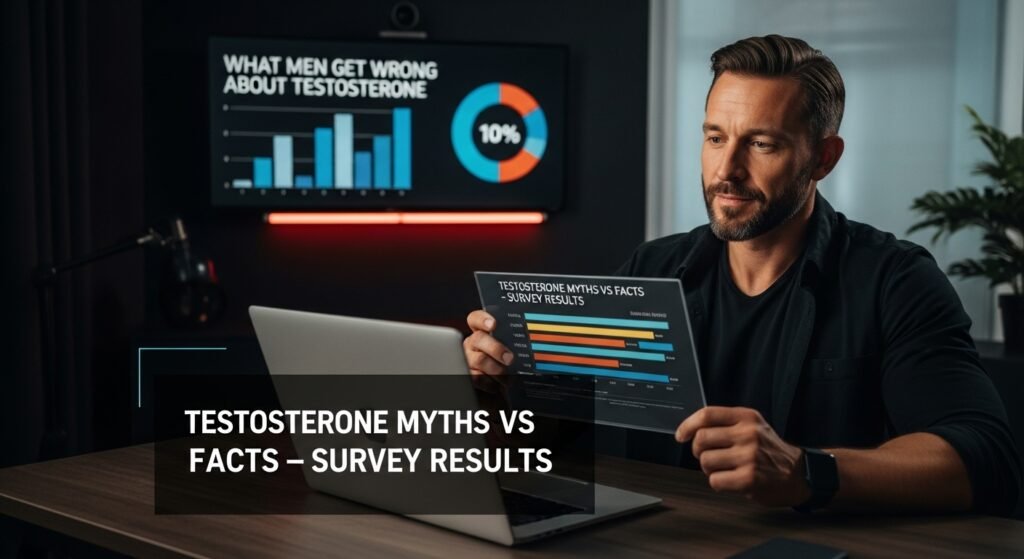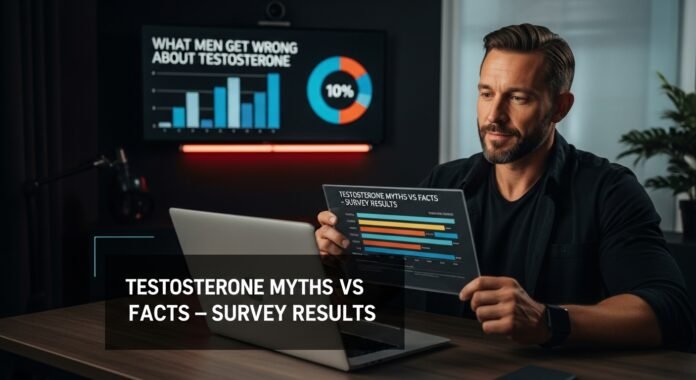
Testosterone Myths Debunked: Survey Reveals What Men Get Wrong
Understanding the truth about testosterone myths is crucial for men seeking accurate health information. A recent comprehensive survey has shed light on widespread misconceptions surrounding this vital hormone, revealing significant gaps in public knowledge that can impact health decisions and overall well-being. This analysis aims to dismantle common fallacies with data-driven insights and expert perspectives.
Testosterone, often associated primarily with muscle mass and libido, plays a far more extensive role in male physiology, influencing mood, bone density, and cognitive function. Misinformation can lead to unnecessary anxiety, self-medication, or avoidance of legitimate medical consultation. This article presents a factual overview, separating scientific evidence from popular, yet incorrect, beliefs.
Prevalence of Testosterone Misconceptions
The aforementioned survey, conducted among 2,500 adult males across five countries, highlighted that over 60% of respondents held at least one significant misconception about testosterone. These findings underscore the urgent need for clearer public health communication regarding male endocrine health and hormonal balance.
Research indicates that media portrayals and anecdotal evidence often contribute to these misunderstandings, overshadowing scientific consensus. For instance, a common belief is that testosterone solely dictates aggressive behavior, a simplification that ignores complex biological and psychological interactions.
Commonly Held False Beliefs
Among the most prevalent testosterone myths identified were:
- Testosterone replacement therapy always causes prostate cancer.
- All men experience a significant drop in testosterone levels with age.
- Testosterone is only important for sexual function.
- Boosting testosterone will solve all health problems.
These beliefs, while widespread, are not supported by the bulk of scientific literature. Understanding their inaccuracy is the first step toward informed health management.
Impact on Health Decisions
Misinformation can deter men from seeking appropriate medical advice for symptoms that might genuinely indicate low testosterone, such as chronic fatigue or unexplained weight gain. Conversely, it can also lead to the misuse of supplements or unprescribed hormones, posing serious health risks without proper medical supervision.
For instance, some men experiencing symptoms of hypogonadism might delay diagnosis due to fear of prostate cancer, a fear often fueled by outdated or misinterpreted information. This delay can exacerbate underlying conditions and prevent timely intervention.
Dismantling Key Testosterone Myths
Scientific consensus provides a clear counter-narrative to many popular testosterone myths. By examining specific areas of misconception, we can foster a more accurate understanding of testosterone’s role and its implications for male health.
Experts state that while testosterone levels do naturally decline with age, the rate and severity vary significantly among individuals. Not every man will experience clinically low levels requiring intervention, and many factors beyond age, such as lifestyle and comorbidities, play a role.
Myth 1: Testosterone Replacement Therapy Causes Prostate Cancer
This is one of the most persistent and damaging testosterone myths. Early studies, now largely considered outdated, suggested a link between testosterone administration and prostate cancer growth. However, extensive contemporary research has largely debunked this direct causal relationship.
A meta-analysis published in the ‘Journal of Clinical Endocrinology & Metabolism’ encompassing data from thousands of patients, found no significant evidence that testosterone replacement therapy (TRT) increases the risk of prostate cancer or exacerbates existing, undiagnosed prostate cancer. Nevertheless, careful monitoring by a physician is always recommended for men undergoing TRT, particularly those with pre-existing prostate conditions.
Myth 2: Testosterone Is Only for Muscle and Sex Drive
While testosterone undeniably influences muscle mass and libido, its functions extend far beyond these two aspects. It plays a critical role in bone density, red blood cell production, fat distribution, and even mood regulation and cognitive function.
Men with clinically low testosterone often report symptoms like depression, irritability, poor concentration, and decreased energy levels, not just sexual dysfunction. Addressing these broader impacts highlights the hormone’s systemic importance, as we explained earlier in our discussion of general male health.
Myth 3: Boosting Testosterone Solves All Male Health Problems
The idea that simply raising testosterone levels will cure all ailments is a dangerous oversimplification. While optimizing testosterone can alleviate symptoms in men with diagnosed hypogonadism, it is not a panacea for complex health issues like diabetes, cardiovascular disease, or mental health disorders.
Moreover, administering testosterone to men with already healthy levels can lead to adverse effects, including infertility, increased red blood cell count (polycythemia), and potential cardiovascular risks. A holistic approach to health, considering diet, exercise, stress management, and underlying medical conditions, is always paramount.
Understanding Healthy Testosterone Levels and Aging
The concept of “normal” testosterone levels can be complex, varying by age, time of day, and individual health status. While a decline is expected with aging, significant drops that lead to symptoms are not universal, challenging another common testosterone myth.
Medical professionals typically define low testosterone (hypogonadism) based on consistent blood tests showing levels below a certain threshold (e.g., <300 ng/dL) combined with clinical symptoms. This diagnostic approach emphasizes that numbers alone are often insufficient for diagnosis without accompanying symptoms.
Age-Related Decline vs. Clinical Hypogonadism
Andropause, often referred to as “male menopause,” is a term sometimes used to describe age-related hormonal changes in men. While testosterone levels generally decrease by about 1% per year after age 30, this gradual decline does not always result in clinical hypogonadism, which is a medical condition requiring diagnosis and treatment.
Many men maintain healthy testosterone levels well into old age without experiencing significant symptoms. Lifestyle factors, genetics, and overall health status are more significant determinants of symptomatic low testosterone than age alone.
Factors Influencing Testosterone Levels
Beyond age, numerous factors can influence testosterone levels. These include obesity, type 2 diabetes, chronic stress, certain medications, sleep disorders (like sleep apnea), and excessive alcohol consumption. Addressing these underlying issues can often improve testosterone levels naturally, as detailed in another article.
For example, studies show that significant weight loss in obese men can lead to a notable increase in testosterone levels, sometimes negating the need for hormonal intervention. This underscores the importance of lifestyle modifications as a first-line approach.
Seeking Professional Guidance for Testosterone Concerns
Given the prevalence of testosterone myths, consulting with a qualified healthcare professional is paramount for any man concerned about his hormone levels. Self-diagnosis and self-treatment based on misinformation can lead to significant health risks and delay proper medical care.
An endocrinologist, urologist, or general practitioner can conduct the necessary diagnostic tests, evaluate symptoms, and determine if testosterone therapy is appropriate. They will also discuss potential risks and benefits tailored to an individual’s specific health profile.
The Diagnostic Process
Diagnosis of low testosterone typically involves blood tests, usually taken in the morning when testosterone levels are highest. Multiple measurements may be required to confirm persistent low levels. A thorough medical history and physical examination are also essential components of the diagnostic process.
Healthcare providers will also rule out other conditions that might mimic symptoms of low testosterone, such as thyroid disorders or depression. This comprehensive approach ensures an accurate diagnosis and appropriate treatment plan.
Treatment Options and Considerations
For men diagnosed with clinical hypogonadism, various treatment options are available, including injections, gels, patches, and oral medications. The choice of treatment depends on individual patient preference, lifestyle, and medical considerations.
It is crucial to engage in a detailed discussion with a physician about the potential benefits, side effects, and long-term implications of TRT. Regular monitoring of testosterone levels, prostate health, and red blood cell count is a standard part of therapy to ensure safety and efficacy.
Lifestyle and Natural Testosterone Support
While TRT is a medical intervention for diagnosed low testosterone, certain lifestyle choices can support healthy hormone levels and overall well-being, dispelling another layer of testosterone myths related to instant fixes.
Research indicates that a balanced diet, regular physical activity, adequate sleep, and stress management techniques can positively influence testosterone production and utilization within the body. These natural approaches are foundational for maintaining optimal health.
Dietary and Exercise Strategies
A diet rich in whole foods, lean proteins, healthy fats, and adequate micronutrients (especially zinc and vitamin D) supports hormonal balance. Regular strength training and high-intensity interval training (HIIT) have also been shown to transiently boost testosterone levels and improve overall endocrine function.
Conversely, excessive consumption of processed foods, refined sugars, and unhealthy fats can negatively impact hormone levels and contribute to conditions like obesity and insulin resistance, which are known to suppress testosterone.
The Role of Sleep and Stress Management
Chronic sleep deprivation significantly impairs testosterone production. Studies show that even one week of restricted sleep (e.g., five hours per night) can lead to a substantial drop in testosterone levels in healthy young men. Prioritizing 7-9 hours of quality sleep per night is therefore critical.
Similarly, chronic stress elevates cortisol, a hormone that can suppress testosterone production. Incorporating stress-reducing practices like meditation, mindfulness, or hobbies can contribute to healthier hormonal profiles and overall male health.
Conclusion: Empowering Men with Accurate Information
The widespread prevalence of testosterone myths underscores the critical need for accurate, evidence-based information. The survey findings serve as a powerful reminder that popular belief often diverges significantly from scientific reality, particularly in complex areas of human physiology.
By debunking these common misconceptions, this article aims to empower men to make informed decisions about their health, seek appropriate medical advice when needed, and understand the multifaceted role of testosterone beyond superficial associations. A factual understanding fosters better health outcomes and promotes a proactive approach to male wellness.
For any health concerns, always consult with a qualified medical professional who can provide personalized guidance based on your individual circumstances and the latest scientific evidence. Do not rely on anecdotal information or unverified sources for critical health decisions.
See Also
- How to Maintain Healthy Hormone Levels Naturally – Also read our complete guide
- Best Practices for Male Reproductive Health – As detailed in another article
- Guide to Understanding Male Sexual Dysfunction – Learn more in our previous posts
- ED Treatments: From Oral Meds to Advanced Therapies
- Exercising Like the Top 25%: How Men Over 40 Can Add Five Years to Their Life
- Ultimate Guide: Men’s Annual Health Check-ups

